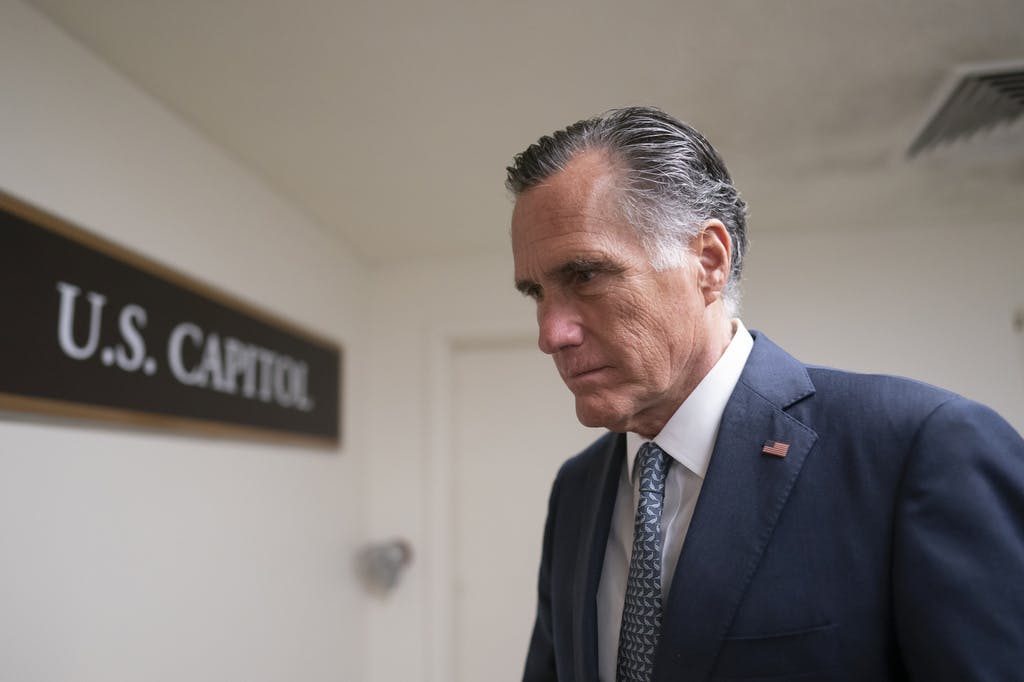Bipartisan Recognition of America’s Worsening Debt Crisis Looms Over Budget Fight
‘It is immoral and unacceptable for my generation to keep adding to the national debt, expecting our grandchildren to foot the bill for our benefits for the rest of their lives,’ Senator Romney says.

A bipartisan, bicameral group of legislators announced Thursday an ambitious starting point to curb America’s national debt — one that could prove to be among the most serious efforts to tackle the issue in decades. Senators Romney and Manchin unveiled legislation aimed at starting the process of closing the budget deficit and bringing down the national debt.
The Fiscal Stability Act — which has been co-sponsored by four Republican senators, three Democrats, and one independent — would “create a bicameral fiscal commission tasked with finding legislative solutions to stabilize and decrease our national debt, which now exceeds $33.6 trillion — more than double what it was just 10 years ago,” according to a notice posted to Mr. Romney’s official website.
“It is immoral and unacceptable for my generation to keep adding to the national debt, expecting our grandchildren to foot the bill for our benefits for the rest of their lives,” Mr. Romney said. Mr. Manchin said Congress “must recognize that America’s fiscal house is not in order and it is past time we get serious about addressing the unsustainable path our national debt is on.”
A similar proposal has been brought to the House by a Republican congressman, Bill Huizenga, and a Democratic congressman, Scott Peters. In a statement, Mr. Peters said that “with interest payments on our debt already exceeding the cost of Medicaid and soon our national defense, it would be irresponsible to keep ignoring this problem.”
The legislation would establish a 16-member commission made up of 12 congressional legislators and four outside experts. The House speaker and minority leader and the Senate majority and minority leaders would each appoint three of their own chamber colleagues, as well as one fiscal expert of their choosing.
The commission would then provide a report and a legislative package no later than May 1, 2025, which would then be voted on by both Houses of Congress. The legislative package would offer solutions on how to “improve the long-term fiscal condition of the Federal Government, stabilize the ratio of public debt to GDP within a 15-year period, and improve solvency of Federal trust funds over a 75-year period.”
Concerns about the national debt have increased in just the last year as members realize that a split government — a Democratic Senate and Republican House — may be a real opportunity to tackle this problem in a serious way. According to an analysis released by Bloomberg on Thursday, the annual interest payment on the national debt crossed $1 trillion for the first time in history, up from around $400 billion just 10 years ago.
Previous debt commissions have failed to solve the problem, though. The National Commission on Fiscal Responsibility and Reform — known as the Simpson-Bowles Commission, named after the co-chairmen, Senator Simpson and a former White House chief of staff, Erskine Bowles — failed to make any structural changes to the debt problem. This legislation, though, may create a better opportunity to bring down the debt, as sitting legislators work together over the next two years to craft the bill.
The bipartisan recognition that America’s national debt now looms as a national security threat serves as an important backdrop to the ongoing budget chaos in the House of Representatives. Speaker Johnson has been unable to move his spending bills due to concerns about insufficient cuts, poison pill amendments, and a lack of strategy to get the White House to sign on to more aggressive deficit reduction.
Mr. Johnson has already been working on a debt commission as his chamber struggles to pass the remaining five appropriations bills that were due in September. “We have some great candidates to chair the debt commission,” Mr. Johnson said, noting that he would announce his choice for the job in the coming weeks.
Just this week, the speaker pulled two of the five remaining appropriations bills from the House floor — the transportation and housing legislation and the financial services bill.

